
--Golden Boy--

In 1937, Frances went East to perform in the Group Theatre and was the female lead in this original stage production written by Clifford Odets.
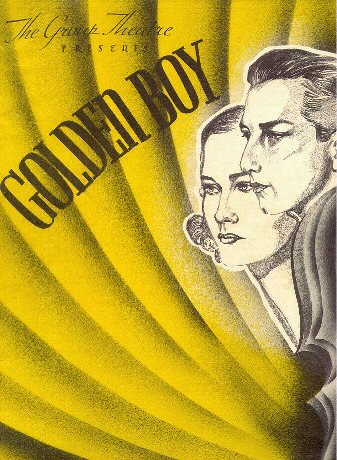
The Golden Boy Program
Cast
Frances Farmer - Lorna Moon
Joe Bonaparte - Luther Adler
Roman Bohmen - Tom Moody
Art Smith - Tokio
Lee J. Cobb - Mr. Carp
Jules Garfield - Siggie
Morris Carnovsky - Mr. Bonaparte
Phoebe Brand - Anna
John O'Malley - Frank Bonaparte
Robert Lewis - Roxy Gottlieb
Elia Kazan - Eddie Fuseli
Harry Bratsburg - Pepper White
Michael Gordon - Mickey
Bert Conway - Call Boy
Martin Ritt - Sam
Howard De Silva - Lewis
Charles Crisp - Drake
Charles Niemeyer - Driscoll
Karl Malden - Barker
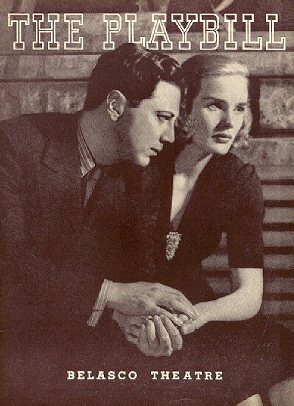
The Playbill cover - Belasco Theatre
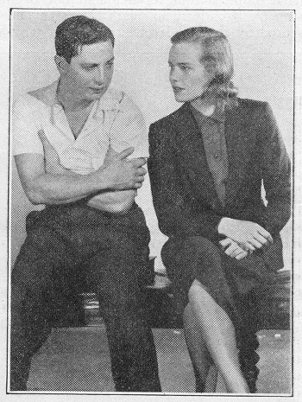
Luther Adler and Frances in Time magazine
-
In 1937, Time wrote: Golden Boy (produced by the Group Theatre) came last week fresh from the vigorous, maturing pen of Playwright Clifford Odets to put up a convincing argument for plain speaking in the spoken drama, for the serious play as a good show. Its dozen scenes sketched the tragic story of a U.S. - Italian family caught in the toils of the prize-fight business. Golden Boy is not in the mass-attack tradition of Odets power play. It singles out cross-eyed, spiritually tormented Joe Bonaparte (Luther Adler), studies his indecision between the violin and pugilism, traces the gradual disintegration of his character in the brutish environment of the ring, and brings him finally to the realization that the false ideals and broken hands of the fight game have ruined his chances for happiness, broken his father's heart. Odets characters are most forceful when they speak the salty idiom of the street, least effective when he hoists them on flights of unnatural rhetoric. Most idiomatic performers in Golden Boy were: Robert Lewis, as the flat-voiced, grasping fight promoter, Roman Bohnen, a typical shoestring manager, and Jules Garfield, recruited from the lead of Having Wonderful Time, as a wise-cracking taxi driver. Despite the handicap of an unbecoming Italian accent, the Group Theatre's veteran Morris Carnovsky is the convincingly pathetic Old World parent, bewildered by a reckless new generation. Hollywood's Frances Farmer, who spent the summer in barn repertory preparing for her Broadway stage debut, was inappropriately cast as "a tramp from Newark," her fresh-faced prettiness belying every tough trait she tried to show.-
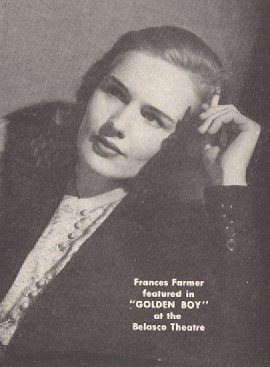
Advertisement in Playbill
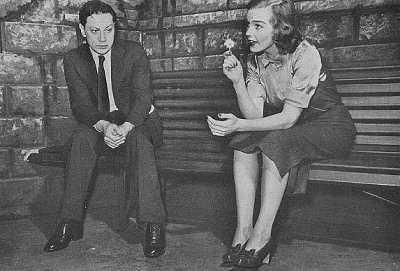
-
Hollywood to New York and the Other Way 'Round
With a certain forlorn dignity, partisans of the stage uphold its position as the standard bearer of the art of acting, maintaining with heat that Hollywood has never sent its own talent to Broadway, whereas the reverse is very often the case. The cinema colony, it is claimed by the embattled denizens of the East Coast, puts so much value on the exploitation of shear personality that a young performer couldn't learn acting there even if he tried. But in "Golden Boy" there is a young lady giving a much acclaimed performance with no record of stage appearance behind her and only a longish list of film engagements. The name is Frances Farmer.
Miss Farmer got her introduction to the theatre at college. A native of Seattle, she attended the University of Washington because Sophie Rosenstein had charge of the drama workshop and she could begin studying there from the very first semester, an unusual procedure. Meanwhile she supported herself through school by working variously as a waitress, a tutor, a movie usherette.
Suddenly and unexpectedly the chance came for a tour abroad as the prize offered by a Seattle newspaper in a subscription contest. To her own amazement, Frances Farmer won. The trip ended with the dazzling surprise of a Paramount contract, for on the way home she was spotted by a screen scout and, in the classic twinkling, found herself facing cameras in California. Intensive work followed, and a round of picture appearances. First there were "Too Many Parents" and ''Border Flight," then ''Rhythm on the Range" with Bing Crosby. Followed "Come and Get It'' and "Toast of New York," both with Edward Arnold, then ''Exclusive.'' Her last was ''Ebb Tide," done in Technicolor.
In the rush of film work, Frances Farmer had small opportunity for the application of what she had learned at school. Some day she hoped to be able to devote great time to it; some time in the future she would surely return to concentrate on acting. That time was nearer than it seemed.
The opportunity came this past summer to appear in "The Petrified Forest" and "At Mrs. Beam's'' in the Westport and Mount Kisco playhouses. Though a film contract bound her, the young actress insisted staunchly on this release and finally secured it.
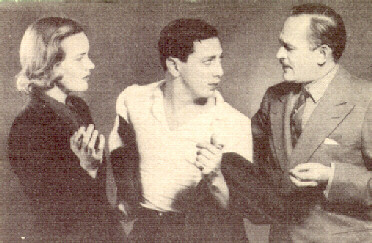
Scene from Golden Boy
At the same time the Group Theatre, planning to begin its seventh season with the newly written "Golden Boy" of Odets, saw her performing in the country and recognized a person they wanted very strongly for the leading feminine role. Paramount was persuaded, after great discussion, to grant still a further leave of absence - in fact, for the full run of the play.
So, breaking the tradition, there comes to Broadway a screen luminary who has never before looked over the footlights at her audiences - not, anyway, in the professional New York playhouse - but who is, despite an exclusive film history, grounded in the principles of acting technique. Miss Farmer's appearance with the Group Theatre is neither the return of the prodigal, as it is with so many players who trek East from the Coast, nor the flashing appearance of a film player on a brief holiday. It represents a simple return to her original studies and the fulfilment of a long deferred ambition.
-
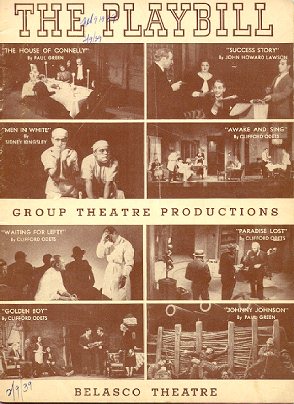

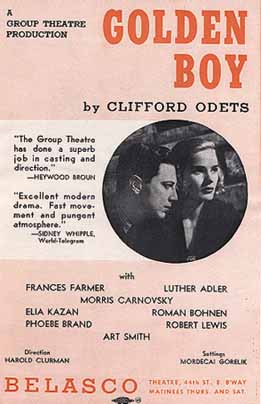
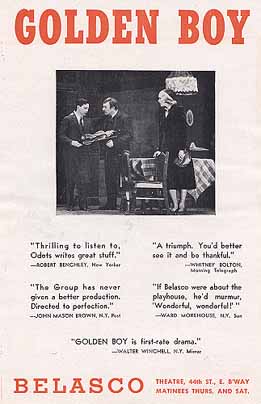 Courtesy of
Kristin Craig
Courtesy of
Kristin Craig
Belasco Theatre Program
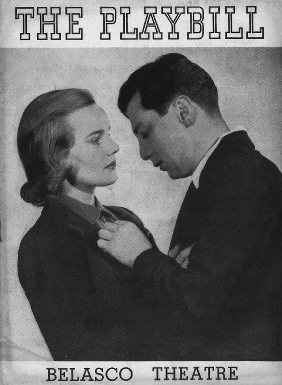
The Playbill cover - Belasco Theatre
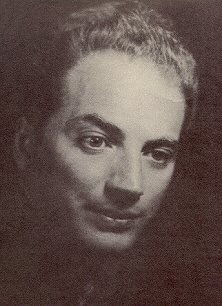
Clifford Odets


This page last updated 2001, Aug 11